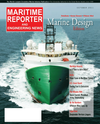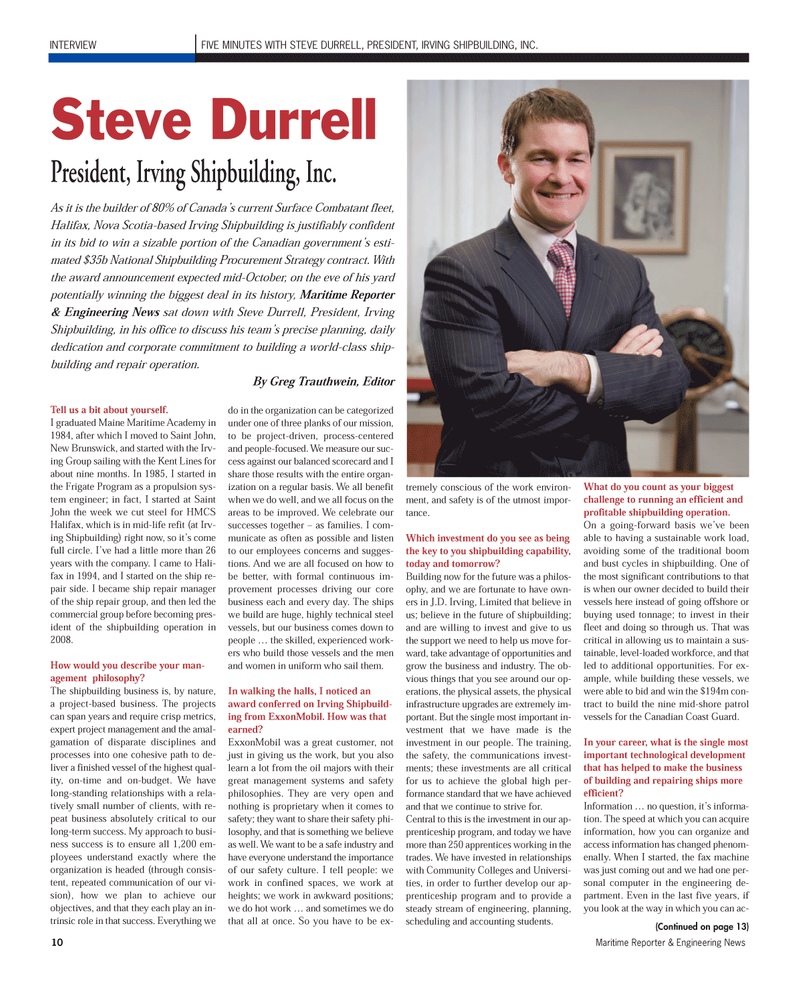
Page 10: of Maritime Reporter Magazine (October 2011)
Marine Design Annual
Read this page in Pdf, Flash or Html5 edition of October 2011 Maritime Reporter Magazine
Tell us a bit about yourself. I graduated Maine Maritime Academy in 1984, after which I moved to Saint John, New Brunswick, and started with the Irv- ing Group sailing with the Kent Lines for about nine months. In 1985, I started inthe Frigate Program as a propulsion sys- tem engineer; in fact, I started at Saint John the week we cut steel for HMCSHalifax, which is in mid-life refit (at Irv- ing Shipbuilding) right now, so it?s come full circle. I?ve had a little more than 26 years with the company. I came to Hali- fax in 1994, and I started on the ship re- pair side. I became ship repair managerof the ship repair group, and then led thecommercial group before becoming pres-ident of the shipbuilding operation in 2008.How would you describe your man- agement philosophy? The shipbuilding business is, by nature, a project-based business. The projects can span years and require crisp metrics,expert project management and the amal- gamation of disparate disciplines and processes into one cohesive path to de- liver a finished vessel of the highest qual- ity, on-time and on-budget. We have long-standing relationships with a rela-tively small number of clients, with re- peat business absolutely critical to our long-term success. My approach to busi- ness success is to ensure all 1,200 em-ployees understand exactly where the organization is headed (through consis- tent, repeated communication of our vi-sion), how we plan to achieve our objectives, and that they each play an in- trinsic role in that success. Everything we do in the organization can be categorized under one of three planks of our mission,to be project-driven, process-centered and people-focused. We measure our suc- cess against our balanced scorecard and I share those results with the entire organ- ization on a regular basis. We all benefit when we do well, and we all focus on theareas to be improved. We celebrate our successes together ? as families. I com- municate as often as possible and listento our employees concerns and sugges- tions. And we are all focused on how to be better, with formal continuous im- provement processes driving our core business each and every day. The ships we build are huge, highly technical steel vessels, but our business comes down to people ? the skilled, experienced work- ers who build those vessels and the men and women in uniform who sail them. In walking the halls, I noticed anaward conferred on Irving Shipbuild- ing from ExxonMobil. How was that earned? ExxonMobil was a great customer, not just in giving us the work, but you also learn a lot from the oil majors with theirgreat management systems and safetyphilosophies. They are very open and nothing is proprietary when it comes tosafety; they want to share their safety phi- losophy, and that is something we believe as well. We want to be a safe industry and have everyone understand the importance of our safety culture. I tell people: wework in confined spaces, we work at heights; we work in awkward positions; we do hot work ? and sometimes we do that all at once. So you have to be ex- tremely conscious of the work environ- ment, and safety is of the utmost impor- tance.Which investment do you see as being the key to you shipbuilding capability, today and tomorrow? Building now for the future was a philos- ophy, and we are fortunate to have own- ers in J.D. Irving, Limited that believe in us; believe in the future of shipbuilding; and are willing to invest and give to us the support we need to help us move for- ward, take advantage of opportunities and grow the business and industry. The ob- vious things that you see around our op-erations, the physical assets, the physical infrastructure upgrades are extremely im- portant. But the single most important in-vestment that we have made is the investment in our people. The training, the safety, the communications invest- ments; these investments are all critical for us to achieve the global high per- formance standard that we have achieved and that we continue to strive for. Central to this is the investment in our ap- prenticeship program, and today we have more than 250 apprentices working in the trades. We have invested in relationships with Community Colleges and Universi- ties, in order to further develop our ap- prenticeship program and to provide a steady stream of engineering, planning,scheduling and accounting students.What do you count as your biggest challenge to running an efficient and profitable shipbuilding operation. On a going-forward basis we?ve been able to having a sustainable work load, avoiding some of the traditional boom and bust cycles in shipbuilding. One of the most significant contributions to that is when our owner decided to build their vessels here instead of going offshore or buying used tonnage; to invest in their fleet and doing so through us. That was critical in allowing us to maintain a sus- tainable, level-loaded workforce, and that led to additional opportunities. For ex- ample, while building these vessels, we were able to bid and win the $194m con-tract to build the nine mid-shore patrol vessels for the Canadian Coast Guard. In your career, what is the single most important technological development that has helped to make the business of building and repairing ships more efficient? Information ? no question, it?s informa- tion. The speed at which you can acquire information, how you can organize and access information has changed phenom-enally. When I started, the fax machine was just coming out and we had one per- sonal computer in the engineering de-partment. Even in the last five years, if you look at the way in which you can ac- INTERVIEWFIVE MINUTES WITH STEVE DURRELL, PRESIDENT, IRVING SHIPBUILDING, INC. 10Maritime Reporter & Engineering News Steve Durrell President, Irving Shipbuilding, Inc. As it is the builder of 80% of Canada?s current Surface Combatant fleet, Halifax, Nova Scotia-based Irving Shipbuilding is justifiably confident in its bid to win a sizable portion of the Canadian government?s esti- mated $35b National Shipbuilding Procurement Strategy contract. With the award announcement expected mid-October, on the eve of his yard potentially winning the biggest deal in its history, Maritime Reporter& Engineering Newssat down with Steve Durrell, President, Irving Shipbuilding, in his office to discuss his team?s precise planning, daily dedication and corporate commitment to building a world-class ship- building and repair operation. By Greg Trauthwein, Editor (Continued on page 13)MR Oct.11 # 2 (10-17):MR Template 10/5/2011 11:08 PM Page 10

 9
9

 11
11
